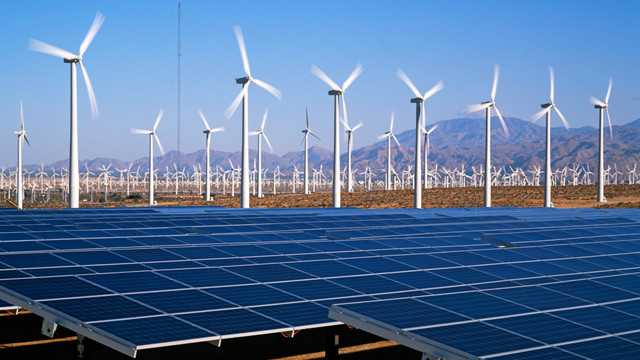
The Different Types of Renewable Energy
As the energy industry faced its toughest challenge in 2022, it’s become clear that being so heavily reliant on the grid for our power is not the best way forward. Understandably more of us will be looking to renewable energy as a way of powering our homes and businesses as rising energy prices continue to fuel the cost of living.
With a push on the UK to become net zero by 2050, there's never been a better time to consider renewable energy in a bid to wean ourselves off the dependency of the big energy companies.
Here, the Energy Efficiency team at City Plumbing lists several types of renewable energy, highlighting three that currently offer the most potential for homeowners and businesses.
What is Renewable Energy?
Renewable energy is any form of energy that can be derived from natural sources - but also be replenished at a higher rate than it’s being consumed. This means it’s being naturally generated, naturally replenished, and will not run out for thousands, or even millions of years in some cases.
This is the opposite for example, for coal, fossil fuels, and other natural gases that we currently burn to generate electricity but which are running out as they've been exploited.
There are several types of renewable energy, including, solar, wind, hydroelectric, geothermal, ocean, hydrogen, and biomass. Yet, right now, three remain a better proposition for UK homeowners and businesses to work towards implementing, including solar energy, wind energy, and biomass energy.
Solar Energy
Perhaps the most common renewable energy and as yet more obtainable for UK residents is solar energy. Solar energy is derived by capturing radiant energy from sunlight. It then converts it into electricity, heat, or hot water. Solar energy’s most obvious benefit is that there's an endless supply of sunlight.
Short and long term, solar energy can help reduce your energy bills. Yet, it's worth noting that solar is an investment, and will perform better with careful consideration of positioning for the maximum sunlight benefits. Yet, with the ability to sell back surplus energy to the grid, solar is certainly the way forward.
The Energy Efficiency team has put together several articles on solar for homeowners and businesses. If you're considering making the move, read how you can get ahead of energy demand by installing solar PV while finding out more about the differences between solar PV and solar thermal.
Wind Energy
Another form of solar energy, by capturing the energy of wind flow, wind farms use turbines to convert the wind into electricity. From single wind turbines to commercial-grade wind generators, there are several forms of systems used to convert wind energy.
The most common wind energy is that of wind turbines we tend to see dotted around the UK countryside. These work to supplement pre-existing energy supplies, while the more commercial systems can power large areas. A clean energy source, wind energy doesn't release any harmful carbon dioxide so it doesn't pollute the air.
Yet, so far, wind farms in the UK are built offshore, with most large scale farms positioned in the sea, and in the more remote or rural areas, because of the availability of space. Also, many places refuse to install them because of their bulky constructions and indeed unattractive designs.
Biomass Energy
A renewable energy derived from biomass is organic matter that comes from recently living plants and organisms. Many people will recognise biomass as the wood used in the fireplace to heat a room. Yet, several other methods are used to generate energy using biomass. This includes burning biomass or harnessing methane gas produced by the natural decomposition of other organic material, for example in ponds or landfills.
Creating biomass energy is seen as a balanced process as, though carbon dioxide is created and put into the air during production, the plants that regenerate consume this carbon dioxide, thus creating the balance.
Biomass energy can be used in homes and businesses. Yet, plants that are used in biomass matter do need time to grow and the technology needed to fuel homes and properties entirely is not yet widespread enough to be able to replace fossil fuels.
The Energy Efficiency team talks about biomass boilers on the blog. Read about what a biomass boiler is and whether it’s suitable for your property.
If you’re considering the possibility of using renewable energy in your own home or business, get in touch with the Energy Efficiency team at City Plumbing. Experts in renewable technology, we’re perfectly placed to advise you on the best solutions of low carbon technologies to help you create a greener and more energy-efficient property.